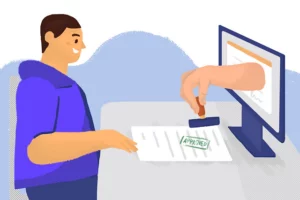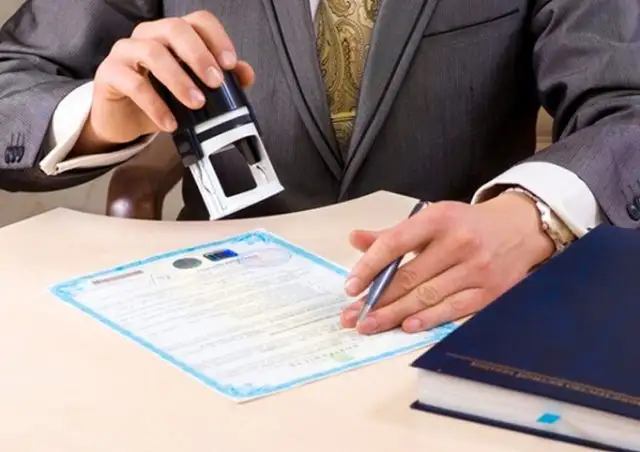DEFINITION:
Documents that have been notarized are those whose authenticity has been attested by a notary public. To ensure that the process is legitimate and that the documents can be trusted by the authorities who requested them, notarization includes the witness and record of the signing of documents.
Main Points
- A notary public has attested to the veracity of documents by signing them as notarized.
- A notary public is a representative who has been instructed to confirm identities, witness the signing, and document the notarization procedure; notaries do not guard against fraud or render legal counsel.
- For documents to be notarized, a number of procedures must be followed, including waiting for a notary to witness before signing anything.
- Documents can be notarized in a variety of locations, including banks, law offices, post offices, and other commercial buildings.
- Online notarization may be possible for some less formal documents.
Definition and Illustrations of Documents Notarized
Documents that have been notarized have been signed in public and verified as genuine. The notary public is an official who witnesses the signatures, confirms the signatures’ authenticity, logs the event in a formal log, and stamps (or “seals”) the document.
When a document deals with significant financial or legal issues that call for a high degree of trust in each party named in the document, notarization is typically required. Documents with a chance of fraud are another category that might require a notary.
For instance, if you are naming a beneficiary on a life insurance policy, you are signing over a significant sum of money and won’t be present to attest to the transaction. Powers of attorney, wills and trusts, advanced directives and other healthcare-related documents, handgun permits, and transfers of title for vehicles or real estate are just a few examples of the numerous types of documents that frequently call for notarization.
How a Notary Public Works
Obtaining a notarized document merely certifies that a signature is valid. Notaries are not required (or expected) to read the content, analyze it for you, or offer legal counsel. The issues you might be agreeing to won’t be disclosed to you by your notary. They simply confirm the date and signature of the signer on a document.
After being notarized, documents may or may not instantly become official. A properly signed and notarized document may be sufficient if all that is required to execute an agreement is a valid signature. Consult a local lawyer for advice on the laws in your area and your specific situation.
Obligations of a notary
A notary’s responsibility is to verify the validity of each signature on a document. This occurs after several thorough inspections:
- Verification of identity: When someone signs a document, a notary requests identification from them and records information about the identification documents each person presents.
- Willing signers: Notaries are instructed to watch out for any indications of coercion. Even if you disagree with a document’s contents, are you signing voluntarily or is someone coercing you to do so?
- Capable of making wise decisions: A notary should ensure that signers have the mental capacity to sign and are in a state where they can fully comprehend the documents they are signing. The notary cannot notarize the document if the signer is intoxicated, under the influence of drugs or alcohol, or is otherwise incapable of understanding what is happening.
If there are any potential issues with the signer, the notary will decline to validate the signature.
Note
You might be able to obtain a notarized document that links you to criminal activity. A useless one that isn’t recognized by the legal system in your state is also an option. Because notaries do not give legal advice, it is your responsibility to understand what you are signing.
Conditions for Notarized Documents
You must visit a notary public, establish your identity, and sign the document in order to have it notarized. Read through the next few steps before beginning the procedure to make sure everything is in order.

Take official identification with you
The notary will request identification in order to confirm that you are who you say you are. You’ll need to present official identification with a photo, such as a driver’s license, passport, or other government-issued ID, though state-specific requirements may apply. The notary has the right to decline notarizing your document if they are not convinced that you are who you claim to be. The notarization of documents is not required.
Put off signing
Bring a blank document to the notary; do not sign it beforehand. Almost always, the notary must watch you sign. They can’t confirm who signed the document if they don’t see you sign it in front of them.
Remit fees
Depending on where you go, you might have to pay a small fee to have your documents notarized. You shouldn’t be shocked if you’re asked to pay a fee because notaries have expenses related to performing their duties as notaries, keeping up with changing laws, and maintaining records. Typically, you’ll spend less than $25, and depending on the state, the cost could be as low as $5. 6.
Where to go to get your documents notarized
Several locations offer notary services for legal documents.
Institutions of finance
The best place to find a notary public is at your neighborhood bank or credit union. The service may be free if you have an account. If you pay a small fee, a notary at a particular financial institution might be willing to notarize something for you even if you don’t have an account there.
Other Companies
There are frequently notaries on hand at both small and well-known companies. As services might vary from location to location, call before traveling. Additionally, a specific employee’s availability is required for the service, so confirm that they are on duty the day you intend to visit. The following places are frequent locations for notaries:
- Stores that offer shipping services (like FedEx and UPS stores).
- Retailers of office supplies (OfficeMax or Staples, for instance).
- Money transfer and check-cashing businesses.
- Automobile dealers.
- Convenience stores in the area.
- Tax preparers and law firms, which frequently have a notary on staff. Ask them if they can notarize a document on-site if you need one for your lawyer.
Sources that are unique
You might be shocked by the sheer number of people who have online profiles and are registered. You might come across reputable notary publics operating from their homes or other less obvious locations.
Note
Your home, place of business, or another location can be visited by a mobile notary to help with paperwork.
Notary online
It is possible to have some documents notarized online, but you must make sure the organization that needs the documents approves of this method. Some circumstances, like real estate deals in some states, call for an on-site notary. The majority of legal documents also call for in-person transactions. It might make sense to try notarizing online in other circumstances (especially if you need to complete a quick transaction and are pressed for time). The notary public must authenticate your identity and videotape your signature when conducting business online. For instance, the Notarize app charges $25.9 for notarial services in Virginia (possibly valid nationwide).
Online notaries might need to go through the same training, study, and exam requirements as in-person notaries, depending on your state’s laws. Rules and regulations differ from state to state.

